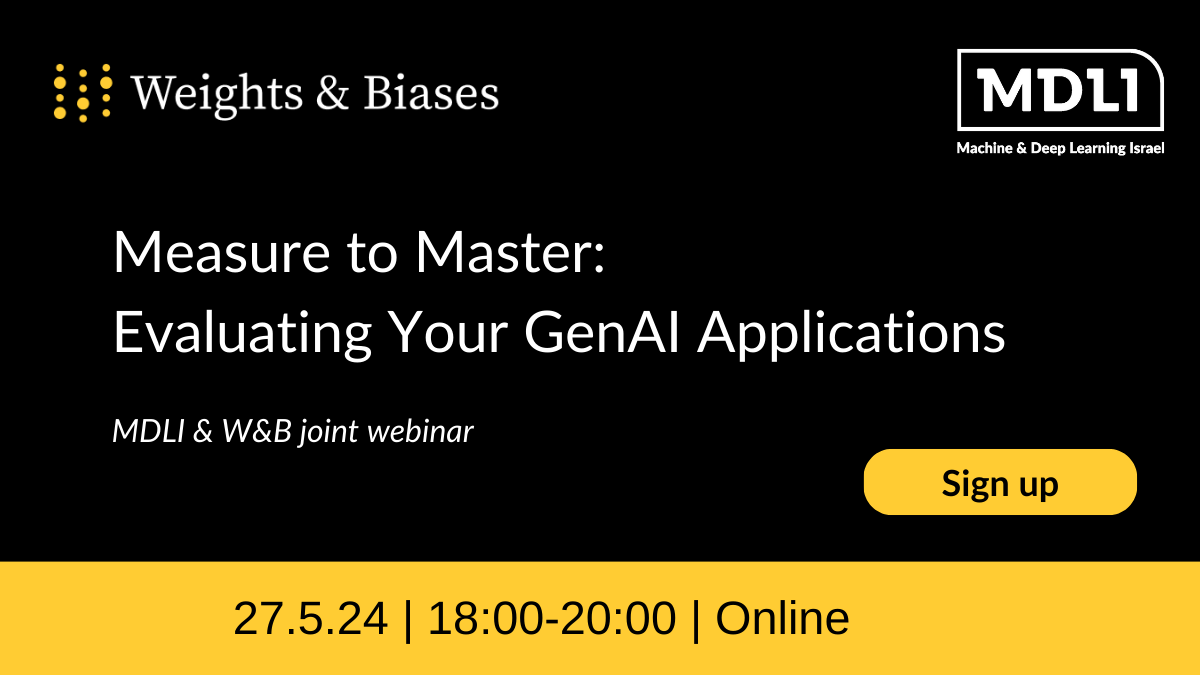#1 MDLI ops – פרטים ורישום

אני שמח להזמין אתכם לאירוע ראשון בסדרת אירועי MDLI ops שיעניק דגש לצד הטכני יותר של העבודה היומיומית. אירועים אלו יעניקו במה לחברות ישראליות שפועלות בתחום, מה שיאפשר להן להגיע לקהל רחב יותר של משתמשים. במקביל אירועים אלו יאפשרו לחברי הקהילה לשתף מתודולוגיות עבודה נכונות או כלים אחרים מומלצים שהם חלק משגרת העבודה שלהם. האירוע הראשון כולל 3 הרצאות מגוונות ומעניינות שיעסקו כל אחת בכלי או בעיה נפוצה בעת אימון מודלים. האירוע יתקיים בתאריך ה-10.5.2020 בשעה 17:30 ויועבר בשידור חי לחברי הקבוצה. כדי שאוכל לדעת באיזה כלי לשדר את האירוע, מה שיושפע מכמות הנרשמים, חשוב להירשם בלינק המצורף כדי שאוכל לדעת כיצד להיערך לכך בהתאם.
ניתן להירשם בלינק הבא.מידע מלא על ההרצאות:
Oren Razon, Co-Founder and CTO at superwise.ai – “Detecting and analyzing concept drift for ML models in production“.
Managing ML models in production is hard.
There is a common phrase saying that “the first day of your model in production is probably the day it will work best”. That’s because that, in contrast to traditional software systems, ML systems are highly dependent on the data that feeds them. Which makes them highly vulnerable to concept drifts that might occur over time.
In this short lecture I will do a quick review of different types of possible concept drifts, will give a few examples from real production systems, and review some of the techniques that could help us to detect and assess it in real time.
Yaron Haviv, Founder and CTO at Iguazio – “Simplify ML Pipeline Automation and Tracking using Kubeflow and serverless functions“.
The process of moving from data-science research to production pipelines is long and resource consuming, new practices like MLOps and tools like Kubeflow (ML toolkit and pipeline management over Kubernetes) are emerging to provide the equivalent of CI/CD for data science projects, but this require dedicated ML engineering teams to translate data-scientists/engineers work to production ready code.
Serverless can simplify data science by automating the process of code to container and enables users to add instrumentation and auto-scaling with minimum overhead. However, serverless has many limitations involving performance, lack of concurrency, lack of GPU support, limited application patterns and limited debugging possibilities. Yaron Haviv will introduce Kubeflow, and how it works with Nuclio and MLRun, open source projects enabling serverless data-science and full ML lifecycle automation over Kubeflow.
Yaron will show real-world examples and a demo and , explain how it can significantly accelerate projects time to market and save resources.
Omri Geller, CEO, and Co-Founder at Run:AI – “New Approaches to GPUs for Large Scale Deep Learning”.
In many organizations that have taken on deep learning (DL) initiatives, GPU resources are allocated statically or even managed manually inside spreadsheets. Companies buy expensive GPU servers but don’t have control, visibility, or a way to maximize utilization of GPUs efficiently for their users. This leads to training bottlenecks and resource allocation issues, impacting the productivity of data scientists, the time to production for DL projects, and the rapid escalation of infrastructure costs.
In this session, led by Omri Geller of Run:AI, we will examine new approaches to the problem of GPU machine management that can maximize resource utilization for deep learning:
- What’s been done in the past?
- Could Kubernetes alone, which is growing quickly in adoption, solve the infrastructure management problem?
- Could advanced scheduling concepts be applicable?
- What can we learn or adapt from HPC for DL projects?
- Can virtualization concepts be applied to better utilize GPUs?



